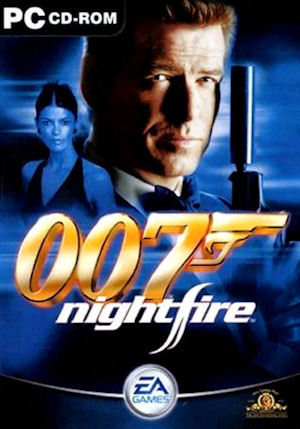Anthony's Film Review
007: Nightfire
(Video Game, 2002)

Although the gameplay and story have limitations, it's still fun to play...
When I started playing the James Bond first-person shooter game Nightfire, I expected one thing: a thrilling action simulation that lets me experience what it's like to be Agent 007, the world's greatest secret agent. That means I want smooth, flawless gameplay as well as a well written story. In addition, Nightfire was released in 2002, a few years after the landmark 1998 FPS game Half-Life, hailed for its incredibly fluid and realistic-looking game environment and advanced artificial intelligence programmed into enemies. Therefore, I couldn't help but hold Nightfire to a relatively high standard.
(Note: The remainder of this review is based on the PC version of the game. It may not necessarily reflect the same game on other systems, namely Sony Playstation 2, Nintendo GameCube, and Microsoft XBox.)
That said, there are strengths and weaknesses with the gameplay itself. I do admire how smooth the screen moves when Bond does and how, in several places, one can use stealth or brawn to complete an objective. Plus, the various weapons and gadgets, including a pen shooting poison darts, a cell phone with a grappling hook, and a personal digital assistant that breaks electronic security codes, are rather neat. In contrast, the gameplay's main weakness involves inadequate artificial intelligence for the enemies. It's only one characteristic of the game, but it made a big difference for me.
I'll give you an example. Imagine you open a door and see an enemy walking with his back towards you. You shoot him in the head with a silenced gun for an instant kill, and no other enemies rush to attack you. Yet, when you go through the open door, an enemy standing just a few feet away starts shooting at you, as if he was completely unaware of his comrade being gunned down. What's even more weird is that this can happen even if you shoot the first guy in the head with a loud unsilenced rifle. Apparently, many enemies rely entirely on line of sight to detect your presence.
Now let's talk about the story. If you're looking to experience Nightfire like a whole new Bond movie, you'll likely be disappointed. The elements of the Bond formula are there, but many remain underdeveloped. For instance, there are not one or two or three but FOUR Bond girls whom you barely get to know: an American agent named Zoe Nightshade, who only appears in the game's first two levels; Dominique Paradis, a French woman who is only seen briefly in pretty much one cutscene; an Australian agent named Alura McCall, who is in the last two levels of the game; and a Japanese bodyguard named Makiko Hayashi, who does have more screen time than the other Bond girls but is still a minor character. It's a case of too many characters with no real development for each. The same is true for the henchman, a brute named Armitage Rook, who only appears in one level in the game.
Even the Bond villain wasn't too impressive. He is Raphael Drake, an industrialist who is working, via the Phoenix International Corporation, to decommision and dismantle nuclear missiles from around the world. As noble as this endeavor is, British intelligence suspects an ulterior motive, which you can probably guess easily. In fact, if you look carefully at the game's opening animation or even the packaging and instruction manual, you can easily guess where the final part of the game takes place. Put it all together and you can predict what evil scheme Bond must stop. (Hint: Think of the 1979 Bond film Moonraker.)
And this is perhaps where I really felt something was missing. There are practically no details about the villain's motive for his scheme. What does he hope to gain through his actions? Usually, villains in James Bond movies have interestingly grandiose reasons for the evil things they do, often discussed in a lengthy monologue in Bond's presence. Not in this game. When you finally face the villain in the climax, you just go straight into fighting him to the death. The last part of the game is essentially rushed to completion.
Lastly, let me talk about Bond himself. I'll give the game designers credit for using Pierce Brosnan's likeness. What I can't give credit for is the voice actor. Instead of Brosnan, Bond is voiced by a British actor named Maxwell Caulfield, whose voice is much deeper and doesn't match Brosnan's face. As for the familiar characters, the voice actress for M, Bond's superior, sounds a bit like Judi Dench (M in the recent Bond movies), but it's definitely not her. Interestingly, Q the gadget guy is featured in Nightfire. He doesn't look or sound like Desmond Llewelyn (Q in most Bond movies), but I was reminded of that actor.
Don't get me wrong. I still enjoyed Nightfire like I do with most FPS games. I liked shooting and sneaking my way through various locales, which include an Austrian airfield, a Japanese estate, the Phoenix corporate building in Tokyo, and a south Pacific island. Plus, the game presents just the right level of challenge when played at the normal difficulty level. With that said, 007: Nightfire is a decent game, good enough that, for a future game, James Bond will return.
Anthony's Rating:










For more information about 007: Nightfire, visit the Internet Movie Database and Moby Games.
Home
Film Reviews
Other Reviews
Commentaries
Links
About AFR
RSS Feed
Privacy Policy
E-mail Anthony











